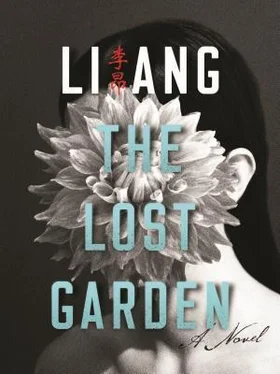She would smile as she listened to the pleasant and yet proper flattering words. It might have been the group of female guests, all with a similar background, or the languid air of the damp spring weather, or even the fragrance of lilies wafting through the house, but she was reminded of the day at the European style café and their chance encounter.
Sitting in her meticulously decorated house, she was forced to believe that it was precisely at the moment when he stood up to leave that she made up her mind. She wanted him, and would do anything and pay any price to have him, for that was the first time in her life that a man could repeatedly get up and walk away from her, and with such determination that nothing would change his mind.
Her first truly indelible memory of her mother was in the year she passed the exam for the provincial girl’s middle school.
When the new students registered, the school conducted the customary hair-length inspection. School regulations stipulated that all female students must keep the length of their hair short, not reaching below their earlobes, which meant they would have newly shaven napes. For several days, Father had shown strong displeasure with the hair-length regulation. He was able to accept the requirement for school uniforms, but not the forced haircut that gave teenage girls an ugly appearance with the stubby ends in back looking like the rear end of a chicken. In fact, he was so upset he cursed repeatedly, using the Japanese word bakayaro , which was rare in his daily speech.
“I should have sent you to Japan earlier. With your two brothers there, and your Sixth Aunt in Tokyo, you’d have plenty of people to look after you. And you’re not like me, who has to stay here as a hostage…”
Mother coughed to cut him off, and then went up to close the windows facing the lily pond, while telling Yinghong to return to Lotus Pavilion to review her English lessons. Yinghong acknowledged her mother’s instruction and got up to leave, when Father said unhappily:
“If Ayako cuts her hair, Otosan won’t want to see her again.”
The moment she stepped out of Flowing Pillow Pavilion, Mother shut the doors behind her. Father had never said anything so severe to her before; she forced back her tears and, standing outside the door, was at a loss as to where to go. Then she heard her father complain in rapid Japanese about the educational system, with the names of some famous political figures thrown in.
When preparing for the entrance exam, all the students had been told that, in addition to the written test, there would be an oral exam that might involve current affairs. Having been told to memorize the names of important political figures, she had copied down all the names her teacher wrote on the blackboard, filling up a whole page of her notebook. Besides foreign officials such as the U.S. President Eisenhower and Secretary of State Dulles, she also had to memorize the names of domestic figures, President Chiang Kai-shek, Vice President Chen Cheng, and Premier Yan Jiagan.
She had committed their names to memory just as she had memorized all the subjects she’d be tested on, though it proved to be difficult, nearly impossible. She was only twelve, and in the town of Lucheng, like the rest of the island, there was no television, and newspapers were not commonly available. Furthermore, her father had often pointed at the papers and said:
“No need to read these useless things. They’re all lies, made up to deceive people.”
As a result, the politicians were new to her and, hence, completely meaningless; but because of the exam, she had forced herself to memorize the names, from the president to all his ministers.
She was surprised to hear the name of a minister she had memorized pop up in her father’s tirade, so she stayed put and listened carefully. But he lowered his voice, and all she could hear through the heavy door of Flowing Pillow Pavilion was the angry tone in words she couldn’t make out.
To everyone’s surprise, Father had displayed such a strong objection to her new hairstyle that even her mother didn’t dare take her to her favorite beauty shop, Eastman, on Zhongshan Road in town, for Mother’s usual stylist, Lina, to cut off Yinghong’s long hair. Many years later, in the United States, when Yinghong came across articles on modern Taiwanese history she thought back to that day and realized that her father’s objection at the time clearly was not limited to her haircut.
“If Ayako kept her hair, the school would not allow her to attend. Then Otosan would teach Ayako himself. Ayako would not learn the useless things they teach at school; instead Otosan would give Ayako real knowledge and there would be no need to believe in their lies.”
Father kept repeating these words, in a calm but determined voice, and as the registration date drew near, Yinghong began to feel anxious, fearful even.
She had been taught to follow Father’s every word. Back in elementary school, when her teacher had sometimes presented different views, she had always sided with her father. But with this matter regarding the hair, she knew she had no choice but to follow the school’s rules.
On the night before registration, her mother brought Mudan over and wrapped her shoulders in a piece of navy-blue cloth printed with two large cranes with spread-wings. With a pair of scissors from Japan, Mother deftly cut off her long hair and then wrapped the shorn hair in a narrow white band of the type normally used to make elastic bands for pants, before handing the scissors to Mudan
“Why don’t you finish up and trim the hair?” Mother said with noticeable apprehension.
One summer afternoon shortly before she left for Japan, Mother took a bundle wrapped in navy-blue cloth from a black lacquered drawer with embossed human figures. After carefully laying the bundle out on the bed, she opened it to reveal prints of two giant cranes, whose white tails were tipped with yellow and green. On the white cranes was scattered a small cluster of long hair that had turned dark brown and lost its luster. Gathered in a yellowed band, the hair was a mess, with tangled fine ends.
“I cut your hair but had no confidence in myself, so I slept badly that night. The next day I asked Otosan how you would be able to study in Japan without middle and high school diplomas.”
“Of course Otosan knew it had to be done; it was just that … you must understand how he felt, Ayako.”
Yinghong remembered her long, beautiful hair, which Mudan had often praised, saying how a woman with fine hair like gold filigree was destined to live an easy life as the mistress of a wealthy family. Yinghong’s was just like that — fine, satin-shiny hair that was soft when you held it in your hand. The hair, with a brown sheen, looked like threads of gold when the sun shone on it.
“Back then I was afraid Otosan would blame me for taking matters into my own hands. So after giving you the haircut, I explained to him that I’d just trimmed it shorter so you wouldn’t look different from the others.”
“When you came home with hair regulation length, short enough to show your earlobes, I told him it had been done by the school’s military instructor.”
Yinghong’s hair had grown a bit by the time she graduated from high school; naturally wavy, it was black and thick, no longer golden and fine, as in her childhood, which prompted Mudan to complain that thick hair can suck away all of a woman’s good fortune. Yinghong responded with a smile, for she liked her hair that way, and, besides, it was just like her mother’s.
“I wasn’t afraid of taking responsibility, nor did I want you to help me deceive your father. All I wanted was to give him an excuse to vent his anger. He could fault me or the military instructor, either one, which would give him a way out. It would have hurt his feelings if he’d known that I’d cut your hair and was not on his side. He’d suffered enough, and I simply couldn’t bring myself to make him feel more alone. And this matter with the hair was a particularly touchy issue with him.”
Читать дальше












